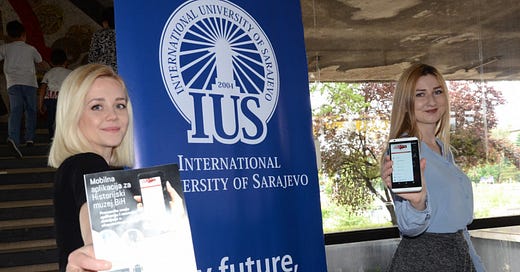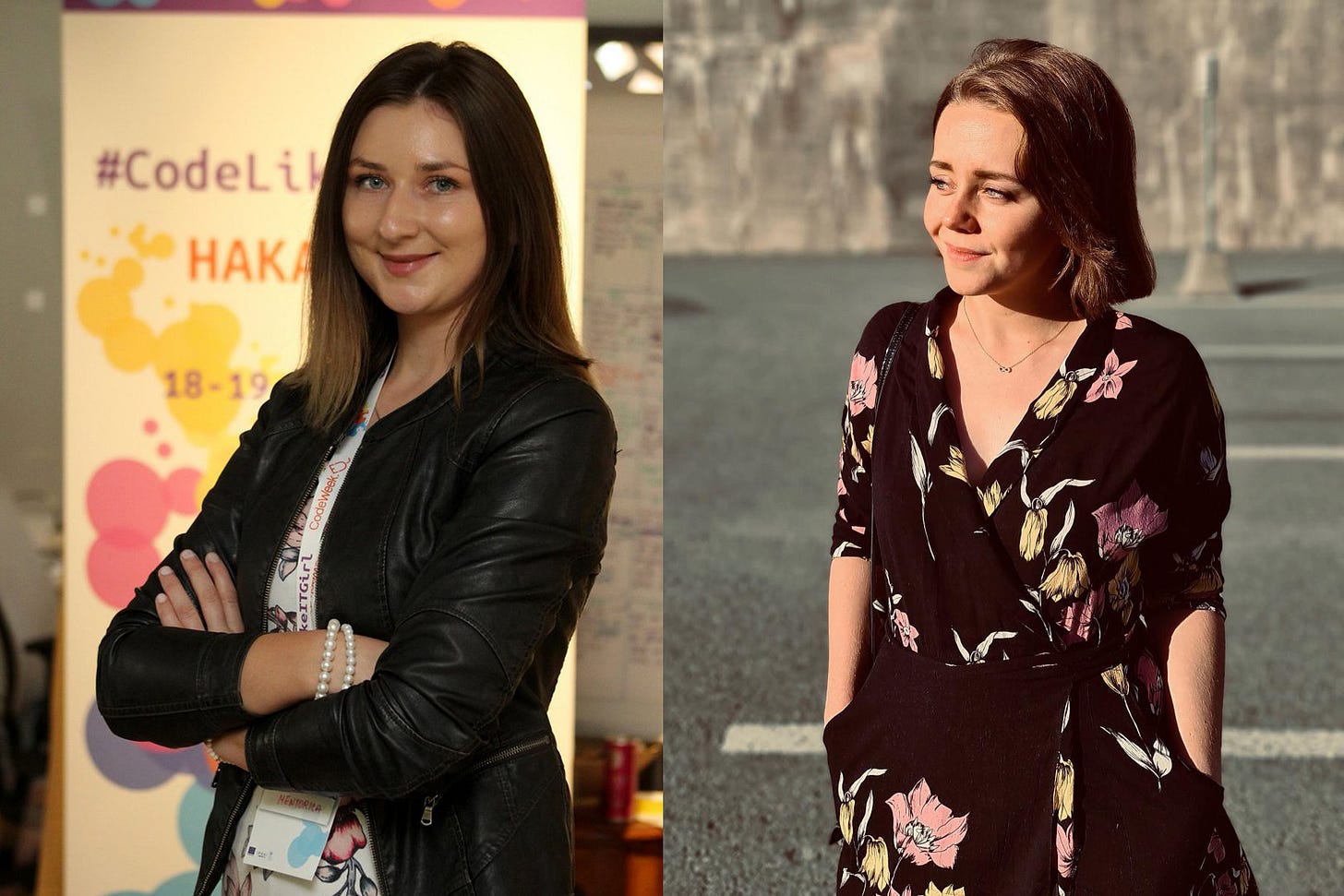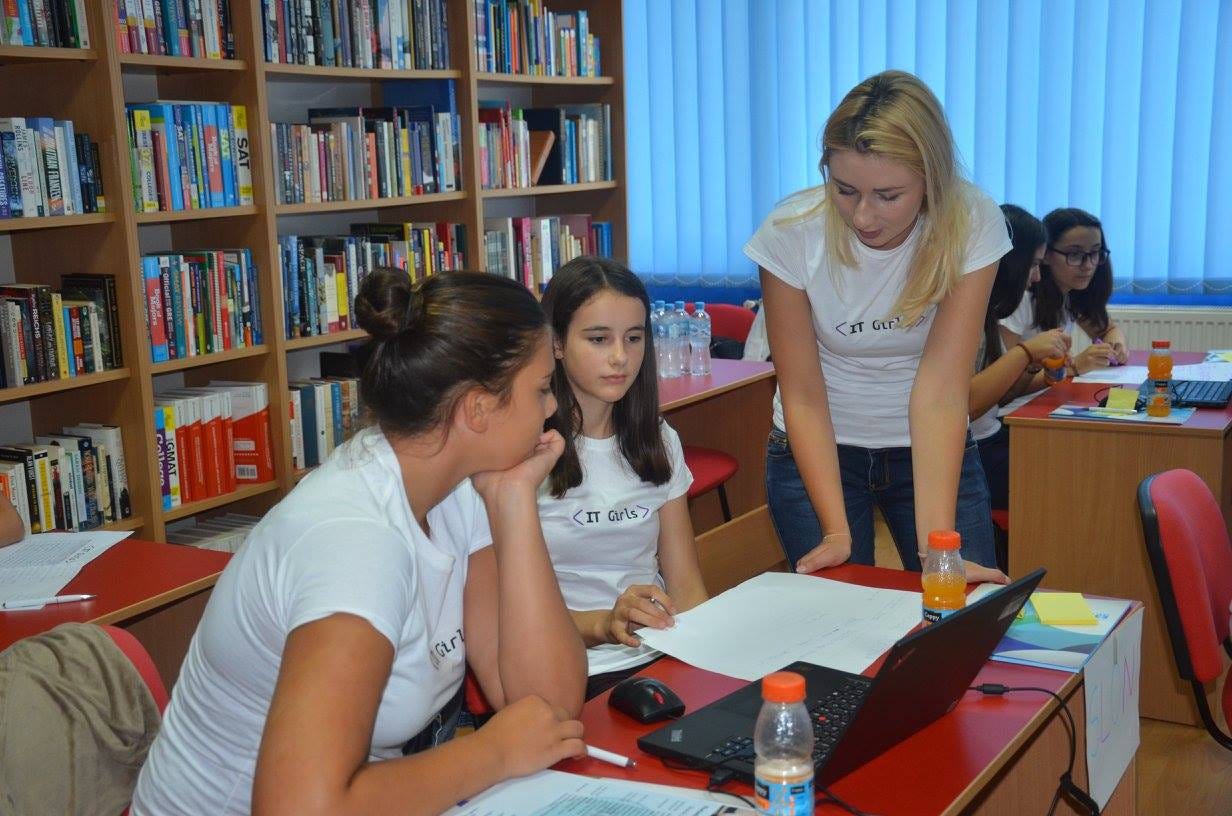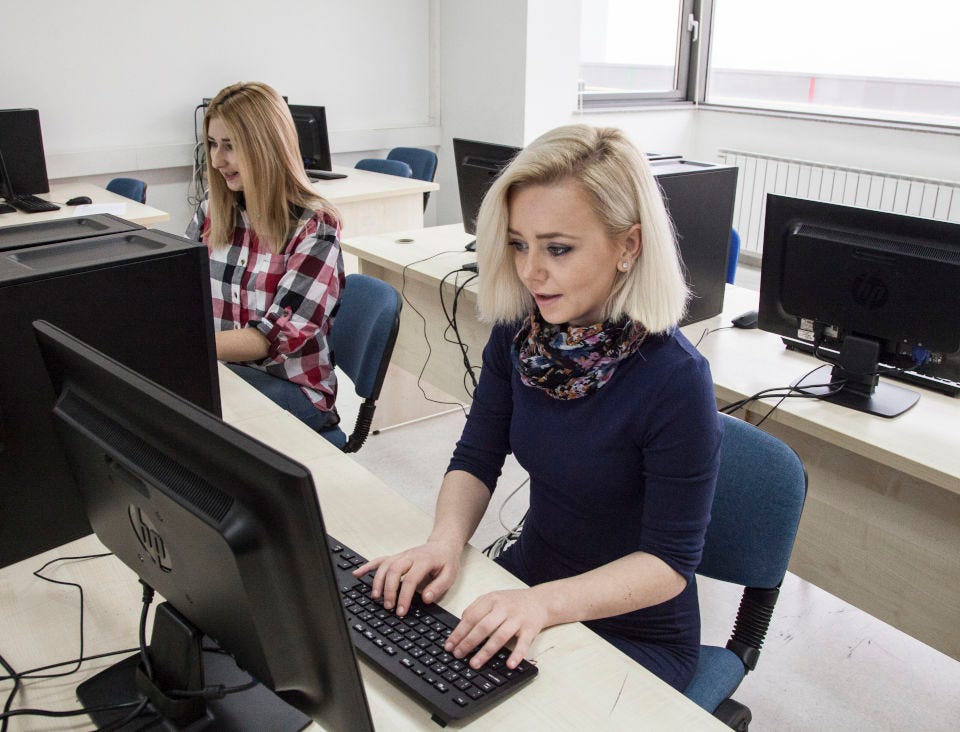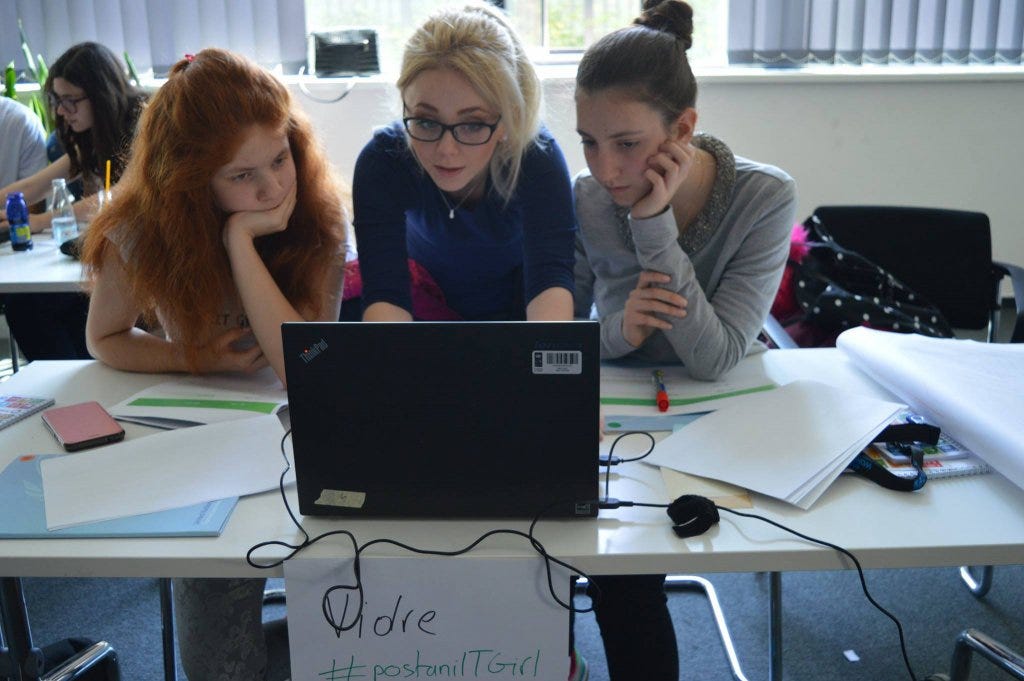XXI. Inspire like a girl, ep. 1
That's the beginning of a new trilogy, about the stories of Sarajevan women who are renewing the image of Bosnia. Džana Bašić and Rialda Spahić share their experience in the IT field
Hi,
welcome back to BarBalkans, the Italian newsletter whose aim is to give a voice to the Western Balkans’ stories, on the 30th anniversary eve of the Yugoslav Wars.
We’ve just ended our journey towards the 25th birthday of “Miss Sarajevo”, the masterpiece by the U2 and Luciano Pavarotti (November, 20).
Today, we continue the journey throughout the month dedicated to Sarajevo and we follow the stories of the people who are renewing the image of Bosnia and Herzegovina.
And the image of the Western Balkans, as well.
We’ll do it with a new trilogy, entirely dedicated to Sarajevan women who are breaking every gender wall and contributing to the economic and social recovery of the country, 25 years after the end of the war.
Role models, young women who can inspire girls (and boys too!) not only in Bosnia and in the Balkans, but all over the world. In the first episode, we’ll discover how is to be a woman in the IT field (information technology).
Džana Bašić and Rialda Spahić have just entered the BarBalkans.
We’ll waste no time, they have the floor… in a double interview!
Dreams, challenges and courage
Let’s start from the beginning. Why did you decide to follow this path?
Džana: “Well, very simply: I liked math. The problem was that in Bosnia, if you like math, most of the times you become a professor in primary or high school. I also love teaching, but I wanted to use my good sense for logic to achieve something bigger.
At the end of the high school, a professor of mine suggested me to try something related to computers. I wasn’t very brilliant in programming, but for me that decision became challenging. I hoped that choosing a career in the IT would bring me to something cool and limit-pushing. And I was right!”
Rialda: “I decided to study computer science and engineering one year before I finished high school. During the weekends, I worked in a gaming club and that sparked my curiosity. I was brave enough to jump into it without previous experience with programming. But it was the best decision I could have made!
I was also privileged, since my mother is an engineer. Therefore, a STEM [science, technology, engineering and mathematics] career has never been something ‘unnatural’ to me. I also took my future into account. I knew that there is plenty of jobs in the IT: something crucial, considering the unemployment rate in Bosnia”.
And where did this choice lead you?
Džana: “I’ve tried different aspects of the IT. Three years ago, I entered the field of the bioinformatics, a bridge between the health and the IT industries. I work on developing algorithms for the analysis of bio data, driving conclusions that lead to enhancing the quality of the living world.
Moreover, this year I started my PhD studies at the Sarajevo School of Science and Technology, while I was pregnant [Džana has just become a mother]. I’m working in the field of machine learning application in the field of microbiome. I hope to develop tools and algorithms that will be used to improve the quality of the health industry”.
Rialda: “After finishing my Master’s degree, I left Sarajevo and moved to Norway for an amazing career opportunity in an energy giant. Two years later, I took a study leave from work to do a PhD in engineering cybernetics at the Norwegian University of Science and Technology, with a project on underwater robotics.
The journey to where I am now has been very exciting and eventful. Through my work, I was included in women empowerment activities even here in Norway. The lack of women in STEM is the global challenge we are facing”.
We are not shy anymore
Now I have to ask you how do you feel as women in such a “male” field.
Džana: “Of course, at the university sometimes you hear mean comments from your male colleagues, like: «How could you get top marks at the test?» But that’s something I’ve never paid much attention to. I guess that my behavior enabled me to feel comfortable in every situation.
We need more women in the IT field, our presence is around 30 per cent. However, I have to say that it changes from company to company: if its work is focused on hardware, the percentage tends to be lower, but if it’s software related, there is a pretty good chance that more women are part of it. We’re taking it over”.
Rialda: “The truth is that there are two sides of this story. The more pessimistic version shows the pressure with regards to the gender. I experienced comments on how I had a good position: because I am a woman, not because I am competent enough. «Girls just don’t have what it takes to be computer engineers», they said. I felt like I continuously needed to prove myself that my opinion matters.
But on the more optimistic side, this happens less and less because we raise awareness on this issue: girls are more included than ever before. And while there are programs designed for promoting women to advance in STEM, we are still getting employed because of our knowledge, skills and contribution, not because of gender”.
So, is the situation getting better for young women?
Džana: “I’m convinced so. Young girls are pretty confident about what they want to do in their lives. If I look back to my experience, a lot of things have changed in seven years. There are many initiatives for women empowerment.
More girls have the chance to emerge, after getting encouragement from role models, who tell them: «If I can do it, you can as well». That’s why now so many young women are not shy anymore”.
Rialda: “Yes! In my case, I’m often the only woman in the room, since I started studying and throughout all the professional experiences. But looking back in schools, the situation is gradually changing for the better. Talking about it is the only way to encourage girls to believe that they are capable to do whatever they want.
In Bosnia, a lot of women are fighting for this and I am very proud of this change. The IT movements are truly having a great impact. Women finally get to speak out because there is support. This is becoming a new normal: hopefully soon, it will be natural to see a girl programmer”.
IT Girls
Both of you have been involved in a specific project of women empowerment. Can you tell us about it?
Džana: “IT Girls is an initiative started in 2016 in Sarajevo by young employers at United Nations in Bosnia and Herzegovina. Its aim is to empower young girls to enter the world of the information technologies.
The other aim is to give a chance not only to girls from the capital city of Bosnia, but also to kids all over the country: experiencing a real IT world in 5-day trainings. We want to show them that they are smart and share with them great female professionals’ experiences”.
Rialda: “IT Girls project has been a true lifestyle changer for me and my colleagues. It opened my eyes and made me realize all the reasons why a young girl would not feel fitted for a STEM career. The aim of the project is to break these barriers and stereotypes.
Girls of every background have to feel comfortable with their gender. So many women have given remarkable breakthroughs in history of science and technology: why would we have to think that we cannot do that anymore? It is important to teach boys the same lessons, too, raising awareness on this issue”.
One memory that you still hold in your heart?
Džana: “We often receive messages from the girls we trained, with the links to websites they created or asking for suggestions. Few days ago, I saw on Facebook the achievements of a 17-year-old girl: she was one of the participants of my first training.
I couldn’t believe how she had changed from that day: she was shy, she didn’t have any advanced training, she thought she wasn’t made for this. You should look at her now, she’s rocking it! That’s what makes me really proud. I wish I had those opportunities when I was in primary or even in high school.
Rialda: “Through the IT Girls trainings, I have met a lot of young girls. Once, there was a competition for the “National day of girls in IT” to write about role models. I was swiped off my feet to hear that two high school girls in Sarajevo wrote essays and made videos about me as their inspiration.
That is worth everything: knowing that you have influenced and encouraged someone to do something that many others are afraid of. I was in those shoes and I know how important it is to have a role model. I’ve never been prouder of anything else than this!”
What would you say to a young girl who has an interest in the IT and STEM fields?
Džana: “I would just tell her to try everything, to take every opportunity she has. Go to every course you would like to know more about, whatever you’re interested in. Just try it and see whether you can find yourself in that field.
Even if it is not fitted for you, that’s ok. There’s a bunch of other fields to discover. Try to find yourself in one of them and when you find yours, just don’t give up. If it’s difficult at the beginning, it means that actually it’s worth it!”
Rialda: “There is absolutely no reason to think women have worse predispositions for science and technology in comparison to our male colleagues. My role models through years have been both women and men and the support I got has been from both.
The most important belief is the one you have in yourself. Once you have that in place, there are no boundaries regardless of your gender. Once you enter the career path of your wish, you will be proud to be there. No man or women can take it away from you!”
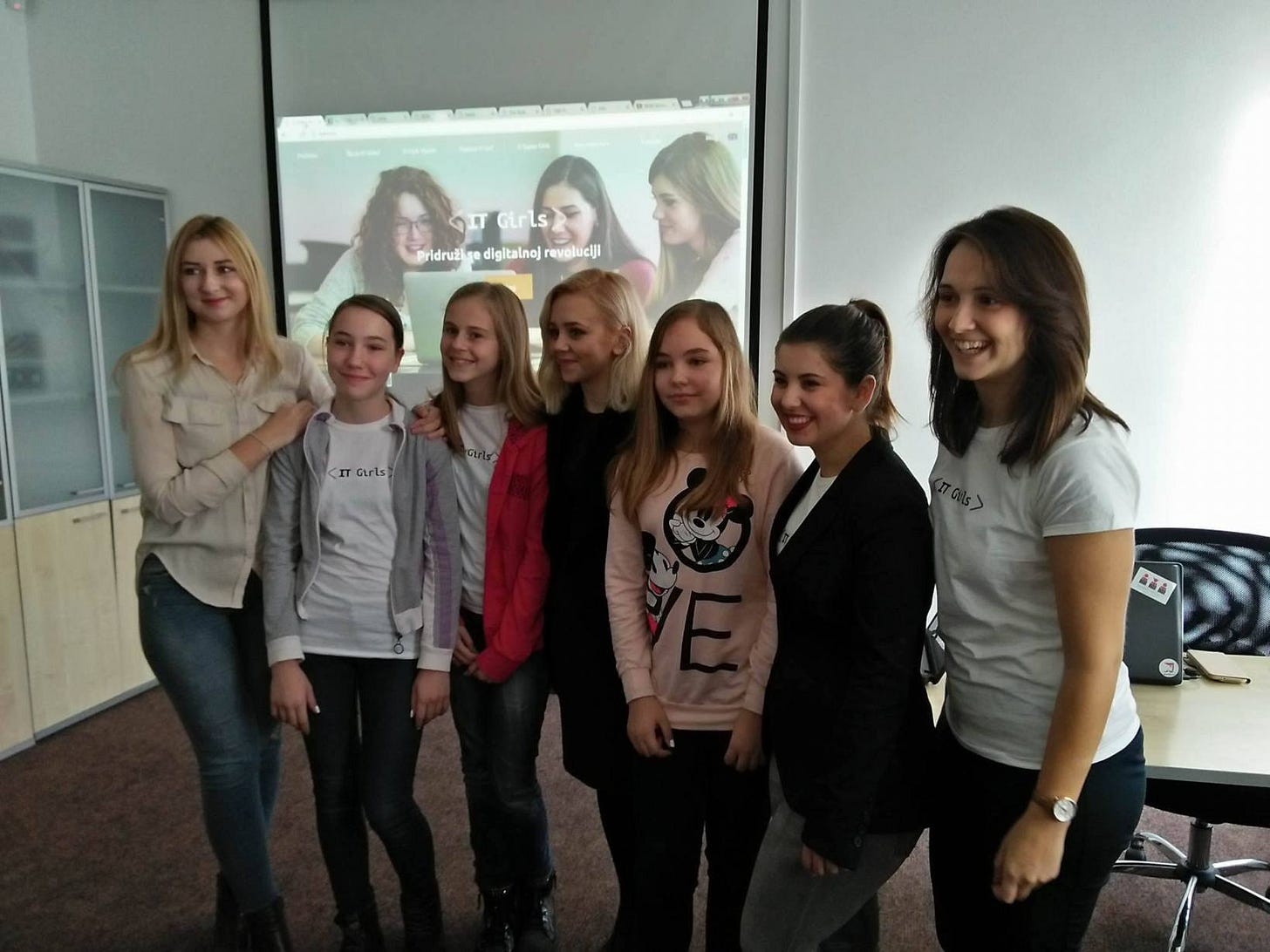
Pit stop. Sittin’ at the BarBalkans
We’ve arrived at the end of the first episode of this new trip/trilogy.
It’s time for a pause.
Before they get back on the road, Džana and Rialda have something to suggest at our bar, the BarBalkans.
We’re all ears!
Džana: “In Sarajevo, we don’t drink only coffee, even if no one can start the morning without drinking the Bosnian coffee. But you can find also many types of herbal or organic tea. People mostly go to the mountains and pick up flowers from the trees: for example elderflowers, that have a lot of health properties”.
Rialda: “I recommend you the salep, a non-alcoholic drink with a very sweet taste. It’s made from the roots of wild orchids and it’s topped off with cinnamon. The Ottomans brought salep to us and it became one of our traditional drinks”.
Let’s continue the BarBalkans journey. We’ll meet again in a week, for the second episode of this trip/trilogy.
A big hug and have a good journey!
I thank you from the bottom of my heart for getting this far. I hope you enjoy the trip and you’d help me to make this experience grow.
You can just subscribe to BarBalkans with your e-mail address, to receive the newsletter automatically every Saturday morning!
Pay attention! The first time you will receive the newsletter, it may go to spam, or to “Promotions Tab”, if you use Gmail. Just move it to “Inbox” and, on the top of the e-mail, flag the specific option to receive the next ones there.
If you want to read the previous newsletters, you can do it here.
And then you can invite whoever you want to subscribe to the newsletter. Just use this button:
BarBalkans is on Facebook and Instagram, too! Follow it on the social media to keep yourself updated on the news of the day.
On the Linktree page you can find a graphically pleasing archive.

